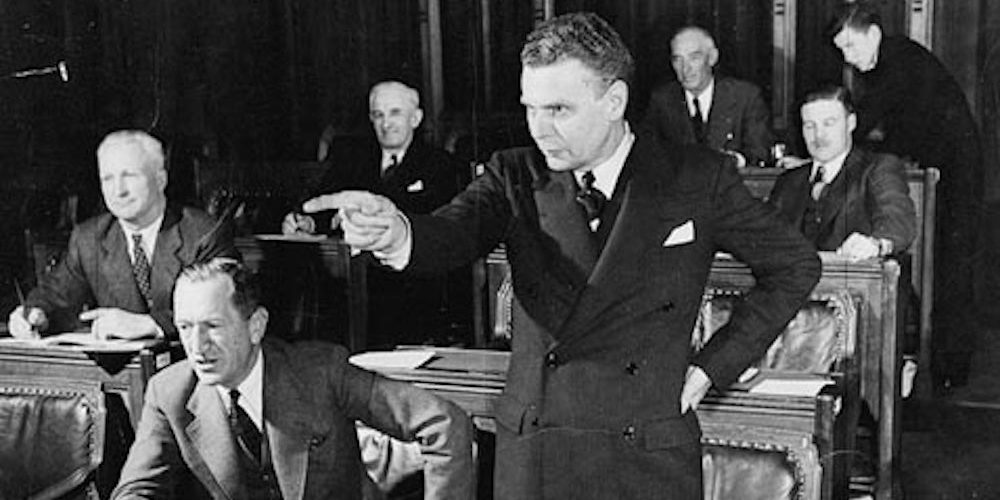There’s been a lot of chatter lately about the Diefenbaker-era Canadian Bill of Rights, especially on social media.
While it doesn’t seem to have hit mainstream commentary in a big way yet, social media is full of references, usually by commenters in the darker corners of the right-wing internet, about the Canadian Bill of Rights, the federal statute enacted in 1960 when John Diefenbaker was Canada’s Progressive Conservative prime minister.
With a Conservative Party of Canada leadership contest under way, and a similar United Conservative Party race in Alberta possibly coming soon, this kind of commentary bound to increase.
Creation of a bill of rights was long a goal for Diefenbaker—he had called a written charter “the only way to stop the march on the part of the government towards arbitrary power.” He is said to have started drafting a bill in 1936, still a would-be politician in Saskatchewan who couldn’t seem to get elected.
That started to change in 1940 when Diefenbaker was elected to the House of Commons. By 1957 he was prime minister, and in a position to turn his dream into reality—sort of.
The bill was introduced by his government on Dominion Day in 1960 and was swiftly passed and enacted.
It never lived up to Diefenbaker’s dreams, though. It was not constitutionally entrenched. It was in conflict with other acts. When this was pointed out in legal arguments, judges mostly shrugged their shoulders and said that was Parliament’s problem. It was an ordinary law that could be amended with a simple majority. It applied only to federal statutes.
Until recently, the Canadian Bill of Rights has been all but forgotten. After all, it was for all intents and purposes subsumed into the Canadian Charter of Rights and Freedoms, part of prime minister Pierre Trudeau’s 1982 constitutional reform package that patriated, as we all used to say, Canada’s Constitution from the United Kingdom.
Since the Charter is entrenched in the Constitution, the supreme law of the land, all other laws must be consistent with it, “subject only to such reasonable limits prescribed by law as can be demonstrably justified in a free and democratic society.”
Yet during the occupation of Ottawa by semi-truck-wielding right-wing extremists, especially after the implementation of the Emergencies Act, news clips often showed “Freedom Convoy” members handing out copies of the Canadian Bill of Rights.
So what’s with that, anyway?
I would suggest a number of things are going on.
For starters—and this is the theme of many of the wild claims about the Canadian Bill of Rights made on social media—it has become a hobbyhorse of “organized pseudolegal commercial argument litigants” who assign to it magical powers that the Charter lacks.
Naturally, this is nonsense, but as we have seen with past #Kudatah theorizing in Alberta and among the Freedom Convoyers, it is nonsense with a powerful appeal that enables its advocates to imagine they can act illegally if only they chant the right incantations before a court.
That this never works seems not to dissuade them.
Still, this has given rise to some recent online commentary that, deprived of context, seems off the wall to the point it’s completely batty.
Says one not atypical tweet: “WE NEED TO ABOLISH THE CHARTER. IT WAS CREATED WITH THE INTENT TO ALLOW FLEXIBILITY. F R E E D O M IS NON NEGOTIABLE. WE ALREADY HAVE THE CANADIAN BILL OF RIGHTS. Nobody can take that away from us. Ever.”*
According to another: “The charter is paving the way to communism…Canadian Bill of Rights for the win!”
Says yet another: “ALL Canadians need to read the Canadian Bill of Rights. This is what we all should follow.”
One doesn’t have to dig very hard to encounter pseudolegal chatter about the Canadian Bill of Rights on the Internet in all its mind-numbing illogic.
Needless to say, this kind of nonsense would have shocked and appalled Diefenbaker, a lawyer and, by most accounts, a very good one.
In addition, since 1982 many Canadian Conservatives have been deeply ambivalent about the Charter. Distrust of the Charter and a desire to somehow weaken it or replace it with a document more compatible with conservative ideological goals has been a powerful stream in the Canadian Conservative movement, as it nowadays likes to style itself.
And at least one of the differences between the Charter and the Bill—the explicit enshrinement of property rights, a boon to the propertied classes as we have seen in the constitutional Republic to our south—is bound to appeal to mainstream conservatives and embolden their efforts to make the Charter more of a tool for the enforcement of neoliberal capitalism.
Plus, of course, a Trudeau gets the lion’s share of the credit for the Charter, which is unquestionably popular with Canadians, another quality that drives many Conservative leaders around the bend—you all know who I have in mind.
For all these reasons—with the Conservative Party of Canada, the People’s Party of Canada, the Maverick Party, and numerous far-right iterations of this kind of thinking in Alberta all clamouring for a way to demonstrate their distinctiveness and appeal to voters, the unlikely revival of John Diefenbaker’s Bill of Rights is not going to go away any time soon.
*I’m not going to provide links to these tweets. They and their ilk are easy enough to find anyway. But I’d hate to inspire anyone to actually try arguing with these nuts, which only encourages them.



